#⋅ ▽ ° ─ bring out the greek chorus ; MUSIC
Explore tagged Tumblr posts
Text
Nevermore is a gothic tragedy. Part I: Classical and Shakespearean Tragedy
This essay assumes that you've read the first season of Nevermore. If you haven't, you'll be eating spoilers.
First of all, a disclaimer: you won't find the term "Gothic tragedy" in theory books, because I just pulled it out of my sleeve. But it seemed appropriate to put it in those terms because, hey, beyond theoretical structuring, genres are also used as a guide to content, and that's kind of what I want to express with this.
Partly because I've noticed that I've called this comic a tragedy on more than one occasion, and talked at length about Lenore and Annabel as gothic characters, but never bothered to delve into these matters, and with the hiatus until (possibly) October, I think it's time to rectify that situation.
But also because I think there are a lot of things in this story that fall into place if you read it under the logic of those genres.
Originally, this was going to be a single essay, but it turns out it took over 2000 fucking words just to explain why it's a fucking tragedy, so I'm going to split this shit in two because I don't want to burn anyone's eyes out.
Tragedy and Types of Tragedy
This is the ridiculously abridged version because this is a really long story, if you want more information on the subject I highly recommend reading Aristotle's Poetics, Nietzsche's The Birth of Tragedy or watching this OSP video for a more proper introduction. If you're interested in Shakespearean tragedy, The Cambridge Shakespeare is a amazing compilation, and here's the essay that talks specifically about what the hell Shakespearean tragedy is.
Tragedy has been linked to the origins of theater as such, found in the festivals dedicated to Dionysus (if you want to know more about the cult of Dionysus, you can watch this video to start), where poetry contests were held, specifically of dithyrambs: lyric compositions dedicated specifically to Dionysus. This later led to the inclusion of an increasingly sophisticated chorus using masks. This was no longer poetry, but the first expressions of theater as we understand it in modern times, at least for Europe and the countries colonized by Europeans.
Nietzsche also points out that tragedy condenses within itself two opposing impulses represented in the gods Apollo and Dionysus, expressed in the terms "Apollonian" and "Dionysian": order, mathematics and music (understood by the Greeks as science) vs. party, debauchery and chaos. The clash between the beautiful and the grotesque (understanding that the "beautiful" can be disturbing and the "grotesque" can be strangely beautiful). This description is not entirely literal, of course, but it must be kept in mind that in order to have the fundamentals of a tragedy, one must have these two elements: order and chaos. A synchronized waltz between the rigid structures and the rupturing.
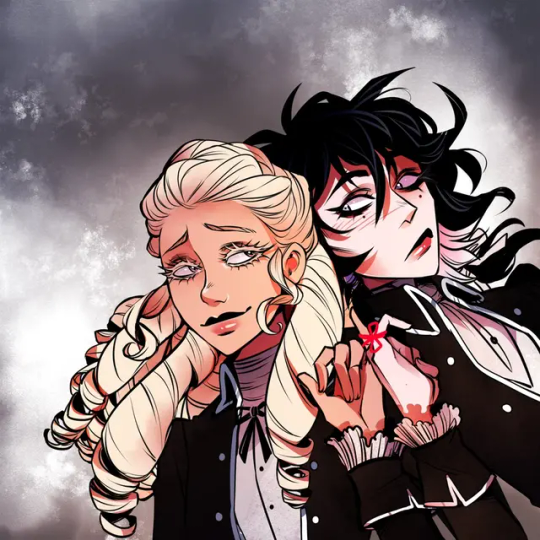
Yes, those two are enough.
Step by step, I think it is important to point out what are the transversal elements to tragedy - classical or Shakespearean - that are present in the comic.
The first important concept that appears on this page is Amarthia. The tragic mistake, the first domino that topples the whole stack, is the specific event that sets tragedy in motion, and we spectators of tragedy can only stare in horror at the situation, knowing that everything that follows will go terribly wrong.
At least as far as its protagonists are concerned, Annabel and Lenore's Amarthia has been said but not seen: the dinner party where Annabel will wear pearls, indicating to Lenore that she is in on the charade. From then on, every step they take will bring them closer to the fate we know: the arrival of both of them in Nevermore. This story ends with them both dead.
And if I had to point out the Amarthia of the comic's topicality, I would dare to say that this is it:
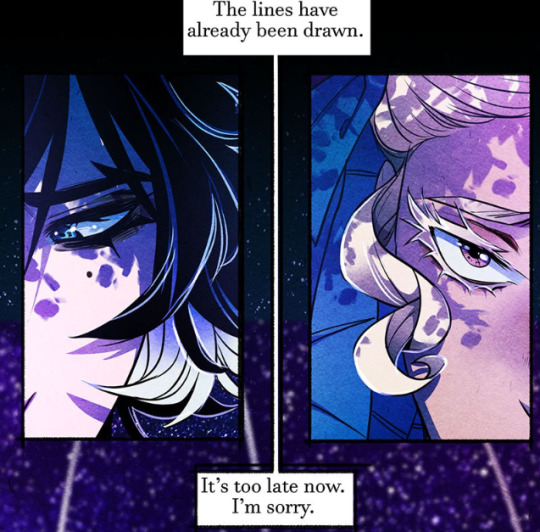
And this:

Annabel refuses to explain to Lenore why the plan has to be the way it is, while Lenore agrees to be part of it (the fact that she disagrees with the whole situation is a plus).
The interesting thing about this is that the roles are reversed: before, Annabel sealed the tragic fate of both of them by accepting Lenore's proposal, while in Nevermore, Lenore sealed the tragic fate of both of them by accepting Annabel's plan.
Another important term that comes up here is hybris. While it is true that hybris represents ego, this does not necessarily mean that the hero is self-centered in a personality sense; hybris is the tragic hero's (misguided, of course) belief that they can turn their terrible situation around. And, well…
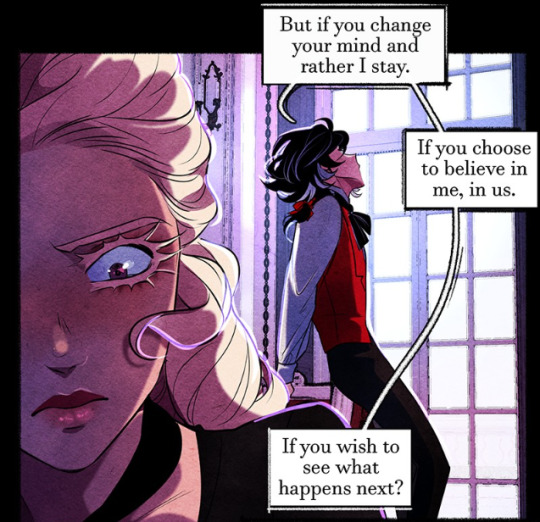
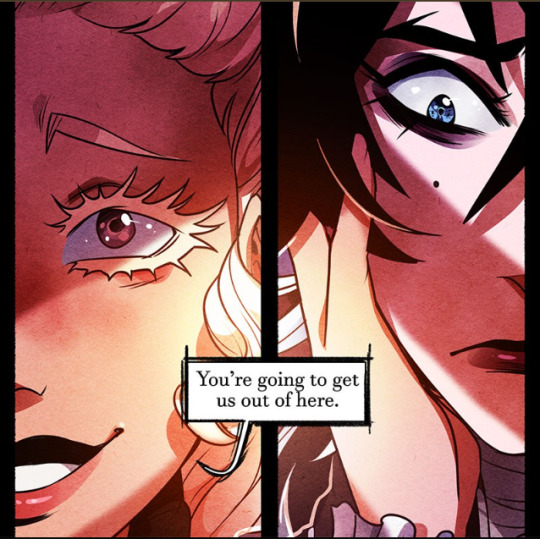
That ends badly in tragedies. Very, very badly.
At this point, it is necessary to start pointing out the elements of each type of tragedy, because something interesting is happening: within the ancient walls of the purgatory that is Nevermore, a classical tragedy is taking place, while in the past, Annabel and Lenore were the protagonists of a Shakespearean tragedy.
Classical Tragedy
One thing to understand about classical tragedy is that these are stories of humanity versus divinity. The predestined fate that comes upon mortals at the hands of beings superior to them, even if those beings do not appear directly. The external forces superior to the characters do not intervene directly (at least not in most cases), but they put all the pieces in place for the tragic hero to fall headlong into his terrible fate "by their own hand". Yeah, that shit is so unfair.
In Nevermore, fate is represented by these two bastards: The Deans act as the ominous shadow of divinity that sets the rules of this battle royale. For all intents and purposes, this pair of bastards represents the tragic fate of the characters: only one will survive to have a second life. And there is (theoretically) no way to escape.
This is where we start to get into thorny issues. If I had to point out the classical tragedy that Nevermore most resembles, I think I'd get a smile out of Hadestown fans: Orpheo and Eurydice.
Okay, let's review: Orpheo is a highly talented musician who, after losing his beloved, goes to the underworld to find her. Hades and Persephone give him a chance to get her back if he doesn't turn around to see her until they leave the place, he does so at the last second, she returns to the underworld, and Orpheus spends the rest of his life in misery mourning her.
That's the thing, the story of Orpheo and Euridice is a tragedy for the most depressing reason of all: love. What seems like a generous gift from Hades and Persephone is actually a condemnation, because they ask Orpheus to do the one thing he could never do: stop looking at his beloved. In some versions of the story, he can't even hear her as they walk; will she really be her, or has he been tricked? Will she be frightened on this journey and he will not be there to comfort her? What if she has trouble on the road or an accident and Orpheus has left her behind? Orpheus loves Eurydice so much that he cannot save her under these circumstances because he cannot stop watching over her long enough to get her out of here.
Now let's go to Annabel and Lenore, the same thing is happening here, these two idiots love each other. It's probably the only thing they know for sure in this bullshit game. And for Annabel and Lenore, to love is to protect, it's to be the shield that will be there to defend their beloved in the face of adversity, she's been hurt in a terrible way and they will do anything to stop anyone from hurting her again.
But tragic fate, represented by the Deans, has set things in motion for this to quickly go to hell:
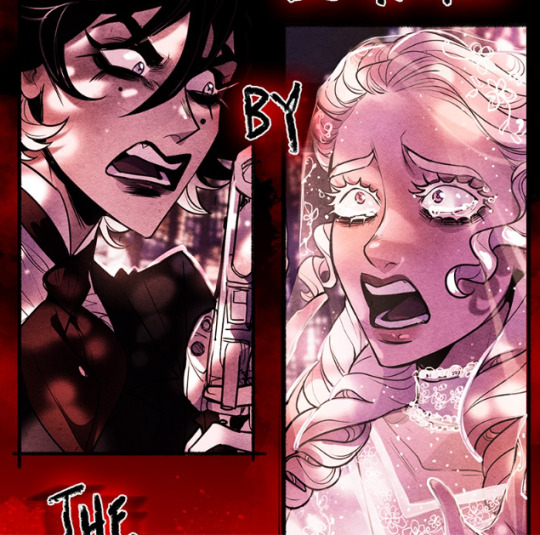
For Lenore to understand Annabel's actions, she would have to tell her that's why she's so afraid, why they shouldn't get attached to anyone, why she thinks it's necessary to pretend they don't remember each other. But Lenore can't be okay with Annabel carrying everything alone, because she sees how it hurts her, because Annabel is clearly hurting. She goes to great lengths to confide in Annabel, but she can't come up with a plausible explanation for all this crap either.
For Annabel, becoming a villain and enduring all this pain is slightly less horrible than dragging Lenore into the Deans' psychotic game. But Lenore just loves her too much to let her do that. Lenore could protect her if Annabel were by her side, so why does she keep leaving? She was hurt the first time, why do it to her a second time?
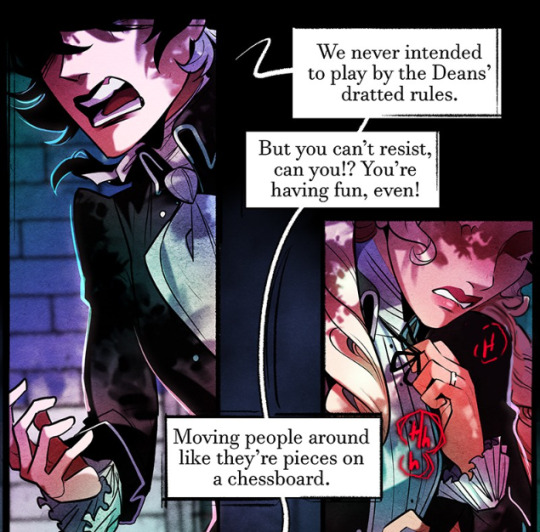

The feeling of not being heard, the frustration that the other just won't listen to her pleas and won't stop what she's doing to allow her to be cared for, runs through both of them because it's the exact same situation, "Why won't you let me do this for you?"
The answer is that Annabel and Lenore are asking the other to do the one thing she could never stop doing: stop trying to protect her. That's why they fight.
This relationship has become a power game that neither can win because they are both exactly the same. A tug-of-war that will only be resolved when something breaks. Hopefully not irreparably.
And speaking of the P-word, let's talk Shakespeare, people.
Shakespearean Tragedy
The good Bard took classical tragedy and brought it back, but changed enough elements of it that it had to be renamed because some of its fundamentals were rewritten. The most notorious of these is that while Shakespeare does not ignore the presence of higher forces or supernatural entities, the fundamental basis of Shakespearean tragedy is not the conflict between humanity and the Fates/Gods.
It is power.
Those who wield power, those who are corrupted by it, and those who crave it. These tragedies speak of moral corruption, the victims of power, and those who sink under the responsibility that power brings.
This is the reason why Shakespeare's tragic heroes belong to the nobility, come from opulent families, or hold important positions. In this case, we have as protagonists two women who were born in a cradle of gold: Lenore apparently comes from a family of old money, and while we do not know if Annabel also comes from a family of old money, we do know that there is no shortage of coins around here.
But status cannot protect Shakespeare's protagonists from the society in which they live, whose agency is sometimes literally represented by people with power. This puts them in a situation from which they cannot escape and which screws them from the start (in other cases the Shakespearean protagonist is the figure of power and seals his own fate). Here, the odds are stacked against them from the start because they are women and, as if that were not enough, lesbians.
I think it's no surprise to anyone that the Shakespearean tragedy most similar to Nevermore is Romeo and Juliet.
Let's review: Romeo and Juliet are two young people who meet at a party and fall madly in love. Their families hate each other, so they cannot be together. The two secretly marry, but after an argument Romeo kills a man and is banished, despite a plan hatched by a priest friend so they can run away together, things go terribly wrong and they both end up committing suicide.
This follows a similar logic to Orpheus and Eurydice: the tragedy here is that these two are in love. But where classical tragedy says, "They love each other so much they can't save themselves," Romeo and Juliet, like Annabel and Lenore, works with two layers of conflict.
The first is the social and political. These young people's families hate each other, so they can't be together. In the same way, Annabel and Lenore can't be together because they're both women.
This is also a reference to one of the central themes of Romeo and Juliet: the clash between tradition and modernity. I think if you squint hard enough, you can see the relationship between these two as Victorian conservatism and homophobia screwing up their lives in the same way that tradition screws up Romeo and Juliet's.
The other layer of the problem is the one that has to do with love: Romeo and Juliet love each other so much that they cannot live without each other. This is what drives them both to suicide, even when they are given the opportunity to continue their lives separately. They love each other so much that they cannot live without each other. Just as Annabel and Lenore desperately want to be together, this is what starts the engine of tragedy when circumstances prevent them from doing so.
Another thing it takes from Romeo and Juliet is the role of the parents as a representation of the power that oppresses the characters. In Romeo and Juliet, the Montague and Capulet lords pull the strings of their children's lives, and it is their resentment that creates the barrier between the lovers. In the case of Nevermore, Ira and Thaddeus are the personal jailers of their respective daughters: Ira wants to get Annabel into an arranged marriage by hook or by crook, and Thaddeus first gets Lenore a fiancé and then keeps her locked up in the fucking attic.
Finally, a tragedy that can be read as a reference to Nevermore, though more subtly, is Macbeth.
The plot is simple: a trio of witches tell Duke Macbeth that he and his descendants will one day be kings. This leads him to murder his cousin, King Duncan, and everything goes downhill from there, because Duncan's murder didn't even amuse the prince.
Yes, at first glance it doesn't seem to make much sense, but that's because it's referring to a specific moment. Specifically, the most discussed and controversial scene in the play: the dialog where Lady Macbeth and Macbeth discuss killing Duncan.
This scene has kept the Bard's fans arguing for centuries: is she manipulating her husband so that she can be queen, or is she just verbalizing Macbeth's wishes that he be allowed to commit the crime, and saying that she will support him in it? Impossible to know unless someone gets a working Ouija board.
This is the same logic that follows the flashback scene where Lenore talks to Annabel about the plan. The important thing here is that the comic decides that the answer is: it depends on who you ask.
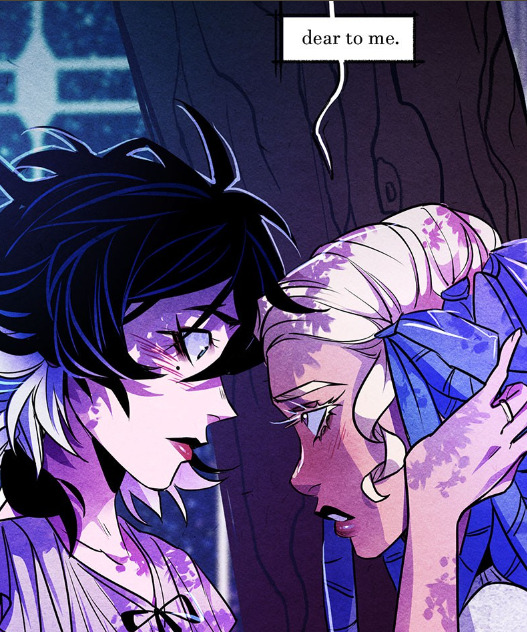
Given Annabel's attitude toward Lenore, we can interpret that she does not think she was manipulated or anything. Lenore is not a devious woman who put things in her head, it was her knight in shining armor who came to save her from a marriage she didn't want. Yes, she may have had her doubts, but she definitely liked her chances, enough to accept them.
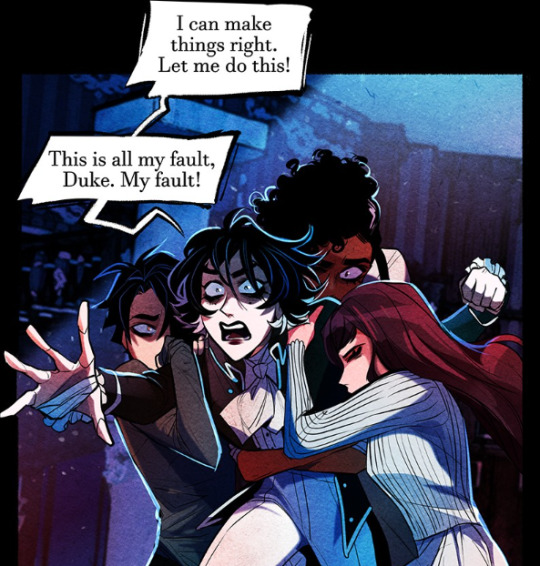
On the other hand, what this tells me is that Lenore thinks the opposite: that she convinced Annabel to be part of this hoax that ended with both of them dead. A crazy woman who dragged the only person she cared about into a dangerous game that cost them their lives, she considers herself as guilty as the perpetrating hand of the crime.
Conclusion
I think the first time I decided to do a review under this particular lens was when I started to notice where Annabel and Lenore's arcs seemed to be going.
On the one hand, given how things are going, it seems that Lenore has to start taking off the blindfold to realize that things aren't as simple as she thinks, and stop letting others make the hard decisions for her because it hurts everyone.
On Annabel's side, you have a character arc that seems to be aimed at being honest with other people, not letting her fears stop her from making risky decisions, and not dealing with all the bullshit herself.
If what I just said leaves a bad taste in your mouth, that's normal. Because it's fucking unfair.
That Lenore should be the one to stand firm - not out of guilt, but out of responsibility - for her actions feels like shit after everything the poor girl has been through. The same thing happens on Annabel's side, that she has to give in to a situation where it makes so much sense for her to shut down, where it makes sense, even without her background, for her to behave that way.
But that sense of injustice is one of the foundations of tragedies. The feeling that, in her situation, it is practically impossible to think that anything different could be done is the basis of catharsis: the pity felt for the character, the fear generated by identifying with their terrible situation.
The expiation of these emotions, which are produced in the spectator by the fall of the tragic hero.
Now, it is interesting to ask how the fall of Annabel and Lenore will be. The simple answer from a tragic point of view is death, a thing we know has already happened once, why not a second time? After all, that's what awaits tragic heroes. Unless you're Medea.
It's impossible to know how the comic will develop, but it seems to me that this is as far as the tragedy goes. For the next part, I want to talk about gothic novels, female vampires, the female writers of the period, and the last gothic. Believe me, buddies, there is no more obsessive romantic bond than that between a Poe protagonist and their dead bride.
#nevermore webtoon#annabel lee nevermore#lenore nevermore#white raven#lenore vandernacht#annabel lee whitlock#annabel lee x lenore#lennabel#nevermore webcomic#nevermore#You know how fucked up it is to realize that in this fucking comic a happy ending would be a plot twist?#I dusted off my notes for this shit#My Shakespeare seminar professor would be proud of me
106 notes
·
View notes
Note
I remain mad that Long Live Evil doesn’t have a movie because I want to edit the characters so bad. What do you mean I can’t make an edit of Eric with the intro of ‘The reason I walked in like I own the place is because I do.’ and the song is Brat by Charlie XCX??? This is ridiculous.
I thank you and I could see it!
Long Live Evil is the book I ‘see’ most of all my books in a cinematic way because I was thinking so much of adaptations as I wrote it. Not of getting an adaptation (though it would be nice, wouldn’t it!) but of how stories change in the telling, as they did with oral tradition and bards back in the day. But as they do now mainly from being transformed from one medium to another.
And that transformation necessitates change. Even a good and considered faithful adaptation should bring with it the change of needing to work in a different medium for a different audience, and the change of another person’s vision altering the telling.
I’m not just talking movies or TV shows in Long Live Evil but plays - we have a major playwright character, we start off with a Richard III epigraph and have innumerable Shakespeare references thereafter - plus references to Greek plays, the chorus, and catharsis - plus musicals and pantomimes (I tried to foreshadow in such a way that some would be surprised and some would spend much of the book yelling ‘behind you! The narrative doom is BEHIND YOU!’).
One major thing shouted out in the acknowledgements was Wicked, a musical that is very different from its book (I really enjoy both), which is getting a movie adaptation I’m interested to see, and which is full of villainous sympathy and joie de vivre. I believe Wicked foreshadowed the runaway success of Frozen.
Musicals are also a refuge for joy and camp in an increasingly self-conscious world of story. I was talking on… sigh… X about the change of Oswald Cobblepot’s name to Oz Cobb in ‘the Batman’ universe and I said ‘everyone is afraid of being cringe, and tbh I think being afraid of being cringe IS cringe. Let’s get a little silly sometimes. Let’s be wild and overblown and sincere.’
Musicals DO that. They have to, by their inherently artificial nature - we can’t pretend people burst into song and dance numbers - and that gives them a certain freedom. I love a musical. I went to see the Vampire Lestat the musical and The Lord of the Rings the musical. I can’t be kept away. The second-most-common note from my critique partners was to get rid of the musical in Long Live Evil and I just couldn’t, as the musical was one of the first seeds of the story, and it said what kind of story I wanted it to be: a joyful celebration of art that wasn’t afraid of anything. Including being cringe.
… I’ve wandered off the point I fear. I would also like to see an adaptation! Love an adaptation.
59 notes
·
View notes
Text
I realise that Hamilton went through a hype-overhype-cringe-establishment cycle fast and hard around here but if you are a musicals person and you haven't listened to LMM's latest, in collaboration with songwriter Eisa Davis, you really should. I haven't got time for a powerpoint so you'll have to cope with bullet points:
plot: gang must get home to Coney Island after being framed for the murder of another gang's leader in the Bronx
most main characters have been genderflipped from the original story, so it's an all-female gang, and a female christlike gang leader who's killed. The narrator/chorus is a woman. And the love interest has been left as a woman so it's also gay now.
so you know how after In the Heights LMM was like 'huh I really didn't give any female characters the chance to rap' and then in Hamilton he had one amazing female rapper? It really feels like after that he went 'huh wait why did I stop at one??? I can have as many amazing rapping women as I want! I will have them all!'
did you know Lin Manuel Miranda really loves New York? I mean the man really fucking loves New York. As someone who really fucking loves my own deeply flawed megacity, I relate very hard to this.
the NY subway system is all over this. the bing bong noises. the announcements. Again, as someone who is perhaps unnecessarily fond of the Tube, I feel incredibly at home.
WE'RE ALL ON THE SAME TRAIN HOME
I cry
did you know Lin Manuel Miranda loves parodying and paying tribute to various musical styles? 75% of this musical is different gangs encountering the Warriors on their journey, each one is a different musical style, each one is a banger
I mean really there's not really a dud in the bunch
although I think funnily enough the latino gang is the least interesting, but it might be that the bits in Spanish are great if you're fluent?
I have a particular fondness for Quiet Girls, in which Billy Porter and his queer and trans gang explain a thing to the Warriors
and Sick of Running, which is superb and cathartic
and We've Got You, the funniest and creepiest boy band parody since Title Of The Song.
it's based on a film which was based on a book which was based on a greek myth (anabasis, not the odyssey, but extremely similar vibes).
The book was apparently GRIM, with GRIM things happening to many of the characters especially the few female ones. The movie softened that, and the musical changes a whole bunch of unnecessarily grim things for things that are... sort of hopefully grim?
The villain is a joker-esque, immature nihilist, but the real antagonist of the story is the NYPD. There is a phone call a few songs in, in which Luther checks in about how his murder went. We never find out who he's calling, and at the same time, we know exactly who he is calling.
the cast of this is just immense. Peggy from Hamilton is the lead character. Persephone from Hadestown is the one who solves all her problems with violence. Ms Lauryn Hill is the doomed christ figure, bringing a gravity and experience to a relatively small role that gave me absolute fucking chills the first time I heard it and I'm not even a proper rap and hip hop fan. The villain is played by a guy called Kim Dracula who is famous partly for his heavy metal songs on TikTok. The lead cop is played by the guy who played Luther in the movie, just in case you were in any kind of doubt about whether ACA in fact B
LMM has also just got a whole bunch of his famous rapper mates to introduce the different NYC boroughs in the opening number which is superb, especially the Staten Island verse with the refrain line which lives rent free in my head now
listen you could quibble about the optimism of the ending and the fact that there is precisely one (1) gun in the whole thing but also, get a grip, it's a musical
women
so many women
women everywhere
we're all on the same train home
9 notes
·
View notes
Text
An Analysis on the New Manson Era
Marilyn Manson is holding his first headlining show since 2019 tonight. The past few days have been pure bliss for Manson fans everywhere. We've gotten a new single, new music video, first stage appearance in 5 years, and soon the first headlining performance in 5 years.
In this post, I want to analyze what we've seen so far. I spoke on the new single a bit in my previous post. I spoke on the new single in my previous post, please check that out if you're interested.
Starting with the MM x NB teaser from May 2024, the costume designer has apparently confirmed that this video is part of a full music video that will be released at a later date.
Within this video, we see a ton of symbolism. In the opening alone, he holds or presents a few items that could have a specific meaning.
He first holds a book, however I'm not sure what this could represent, and I don't know what the book he's holding is either.
After, he holds a key which represents knowledge, strength and contempt, as well as having control.
The throne shown represents authority and the sword in front of the throne represents justice, but in Greek mythology it can also be a sign of vengeance.
The apple he holds represents wisdom or the forbidden fruit.

I noticed a lot of symbolism relating to the human body as well, for example the glass oxygen mask he holds to his face, or the costume he wears that represents the veins in the body.
Throughout this whole era, we've seen a lot of imagery with flowers. When we see this full image of Manson, we can see calla lilies. These flowers are poisonous if eaten and represent resurrection and rebirth. Behind him, we see a structure covered with white flowers which could be these same flowers, roses, and yellow birds.

At the end of the teaser, we hear the outro to As Sick as the Secrets Within: "Keep sleeping, I'll make you dream of me"
In the lyrics for As Sick as the Secrets Within, we get a bit of a reflection of the past few years for Manson, which is why the cover is an image of his reflection in a piece of a broken mirror.
"I built this cage we've been trapped in together, can't remember where I hid the keys" -- This could be about Manson starting problems and dragging others into it and then struggling to get them out of the mess he created. He is realizing that his actions have negatively affected himself and those around him.
"A reason for me, for me to get by became a need, a need to get high" -- Manson first started using drugs, like he says, to get by, but it became a need, an addiction.
"Then into a life that was no life at all" -- In his addiction, he was alive he wasn't truly living.
The chorus, to me, is about how your trauma and hurt can only control you as much as you let it. You can become your full self when you stop letting your problems take over you. The beast he mentions can be a representation of misery or the struggle to break pattern, and it tries to pull us back in and control us.
"Keep sleeping, I'll make you dream of me" -- Manson saying that even if you ignore him or turn a blind eye, he'll make you notice and hear him. He's always said that he doesn't care what you think of him as long as you think of him.
In the music video for As Sick as the Secrets Within, we see a lot of imagery with tentacles. This could just be a reference to Evan Rachel Wood's documentary, Phoenix Rising, which depicts Manson as a creature that uses his tentacles to bring her down. But these images could also serve as a very literal metaphor, symbolizing a strong, threatening force. He is a force to be reckoned with.
I noticed in the first image we see with the tentacles, it appears as the white part is the body of a woman and the black tentacles are reaching around the legs to get inside.

We see a lot of black and white imagery in this video, similar to the Say10 music video. Black represents evil and dark, white represents the good and purity. This picture could be an image of evil infiltrating good.
We also see a lot of red poppies in the opening. These signify hope for the future, but also remembrance. We also see a car in a field of these same poppies. It looks similar to the car JFK was assassinated in.

We see a skin-like sack entrapping Manson through the music video. It's covered in purple and red lines that look like veins. This could be a nod to his "wormboy" image he's used throughout his career. His arms are folded over his chest and he breathes through his mouth in an apparent struggle. He lays on a metal-like table, like an experiment.
Maybe this is the "skin" he refers to when saying there's a trick to get out of your skin. He's telling you that you can only be reborn by letting go of your trauma and secrets.

There's an image of a cross in front of a cross in front of a symbol on the wall made up by different papers with writings of suspected lyrics for the new album and a sort of spiral drawing. The papers appear to make up the shape of the image we see in the stage of his recent performance as well as other promotions.
An image of a triangle with a horizontal line through it flashes on the screen with a foggy background. This sign is the symbol for air in alchemy.

Manson waves around a key while saying "you're only as sick as the secrets within", he'sa saying he is no longer controlled by his secrets, he now has the key to break free.
The cup he drinks from causes a shift in the video. As he drinks, blood pours into the background. This may represent the wrath he will bring onto those who have hurt him.

He then breaks out of the yolk sac containing him, the birth of a new version of himself.
These last few years have been hard on him, but he came out on top, and he wants to show us that with this video and with this song.
#journalism#music#rock music#writing#marilyn manson#as sick as the secrets within#fan theory#music video#music analysis
17 notes
·
View notes
Text
Preaching to the Chorus
About three years ago, Troy Baker pitched the idea of a video game musical called Chorus. What struck me, beyond the fact it was asking for donations as it was a crowdfunded project, were the high profile voice actors taking part, the art style, the bringing on of composer Austin Wintory and that it was being developed by an Australian developer! Years later, there was almost no word or hint of the game and I feared the worst. For a good long while, I wondered if I had just imagined the game being announced. Until, of course, Summerfall Studios announced the upcoming release of Stray Gods in August 2023! Suddenly, we had a release date and songs to enjoy after years of what had felt like absolute silence.
Yes, Chorus had changed its name but it was still the same premise I was promised: an urban fantasy Greek-mythology inspired musical where I got to make decisions on where the songs went. Needless to say, I was excited!
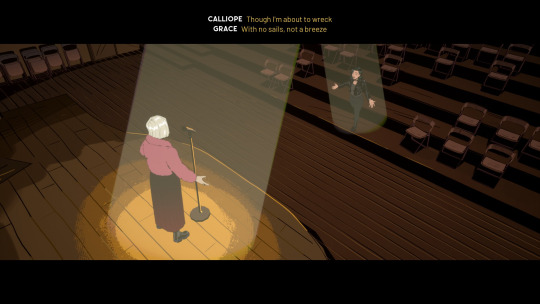
Despite it releasing in August, I didn't get to play the game until much later in 2023 when I finally got a bit of a breather between all my lengthy video games sucking up most of my time (and the fact I work full-time and commit to writing my stories and watching endless TV shows to be up-to-date on whatever is popular). Well, no. That's a lie. I've put a few games on the back burner like Octopath Traveler II and Like a Dragon: Ishin! (they are totally going to be played soon, I promise!)
In any case, I purchased the game while it was on sale (a measly 20% or so) and then stepped into the shoes of Grace. And almost immediately connected with her feelings of being cast adrift. Like so many people who have graduated university, and who didn't immediately apply for graduate programs, she's a little lost and unsure of her direction in life. Enter Calliope.
After the two share a duet together, Grace returns to the apartment she shares with longtime best friend: Freddie. As she rests, there's a knock on the door and lo! Calliope staggers through clutching a ghastly wound. With her last breath, she passes on her eidolon (the soul? and memories of an Idol) before dying in poor traumatised Grace's arms.
As Grace, understandably, panics, at the sudden turn of events, Hermes steps through the front door and tells Grace she needs to meet the Chorus. Within moments, Grace is taken to an upscale office room where she is greeted by Apollo, Persephone, Aphrodite and Athena. Before Grace can get a word in edgewise, these Idols (as the Gods now call themselves - although it makes me wonder if other pantheons exist in this world created by Summerfall), decide to execute Grace for the crime of maybe-possibly killing Calliope. That is until Apollo protests.
And protest he must consider later plot points. Such as him divulging the prophecy leading to Calliope's murder!


Honestly, so much of the story could have been resolved if Apollo stopped being a sad boy and actually used some brains to more cleverly resolve Grace's predicament. Instead, we have Grace run around the city for a week in a bid to prove her innocence and figure out the truth behind Calliope's death.
But what a wonderful week it was as several Idols help out, from the fast-talking Pan to the scary Medusa (with a very cute monster voice from Anjali Bhimani). But who can forget, and forgive me as a I fan myself and swoon over, the dommy mummy: Persephone. The design! The voice! The attitude? Gosh, I just wanted Persephone to step all over me. And considering the height difference she had over Grace?
Just...
I'm just going to die in a corner over here now.
Anyways, diversion aside, the plot was serviceable. It wasn't the most mindblowing story to be told but I liked how it introduced us to many of the Greek Gods and mythological creatures hiding in America, whilst weaving it in the murder mystery plot at its core. While the game threw out new leads often, I didn't ever feel an urgency to solve the crime or fear I'd not be able to figure out the murderer. Sherlock Holmes, this is not.
Rather, no matter which scenes you may wish to complete first (and I always went back to the Underworld to chat up Persephone), I feel like the end-point is almost always the same with our villain being unmasked as the smiling cookie-giver!

From a gameplay perspective, Stray Gods doesn't offer much. It's pretty much a visual novel where the player selects dialogue options or the next part of the song they wish to sing. There's no walking around or exploring the wondrous set pieces you find yourself in. Nor is there any random clicking on background objects for some light commentary or to pocket away clues to be presented at some other time.
In fact, there's no real animation to the game either. Most of the characters are stills, changing their posture as the dialogue or songs demand. Like flipping through a comic book or going from pane to pane.
But what does make Stray Gods stand out are the songs. Yes, there are some where I felt like it faltered: Asterion and Hecate's song (with the volume turned way too low) and some of the weaker blue options in Challenging a Queen. To me, it just wasn't as melodic as they could be and sounded a little jarring. Still, these were glossed over by several other standout songs like The Throne and the Ritual.
Speaking of The Ritual, while I did feel for Aphrodite, I didn't much like her selfish actions of dying and passing her trauma onto another poor soul. Like, either go to therapy and work on your issues or just die permanently and stop inflicting someone else with your trauma! Forgetting is not the path forward. And maintaining the cycle of the next Aphrodite reawakening to your traumatic memories of the Second World War whilst your son, Eros, deals with the fallout is NOT healthy.
On a side note, I liked how the melody of Adrift was used in the background of the game and was also revisited during The Trial.

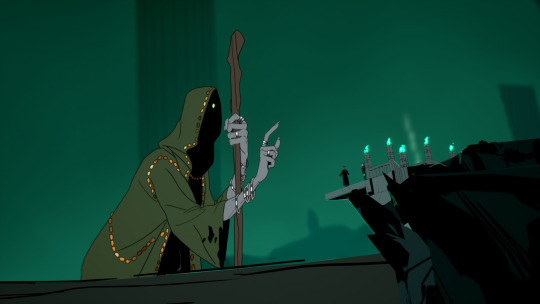
As for the actual singing, I'm still impressed by the singing of so many of the voice actors. I mean, I wasn't surprised by Troy Baker considering he was a musician before he was a voice actor. And Felicia Day...well, considering I'd stumbled upon her back in her The Guild days, knew she could sing because of the songs she released. And the fact she appeared in Dr Horrible's Sing-Along Blog alongside Neil Patrick Harris and Nathan Fillion.
While I did like Laura Bailey, there were moments when I felt her vocals were just a little too raw and weren't able to hit the notes as well as could be. No shade on Laura, though. I love Laura Bailey! And she had a tough task with so many variations to sing!
Still, I did like her rapping. MORE LAURA BAILEY RAPPING PLEASE! Especially in the Challenging a Queen song.
But I do wonder what Stray Gods might have been like if we had actual Broadway actors brought in for the singing with stronger vocals and/ or melodies.
But I must say, my absolute favourite singer was Mary Elizabeth McGlynn. How could I not? She voiced Persephone! And I so wanted to romance her!
In the end, though, I foiled my chances because I was trying to play in-character by asking myself 'What would Grace do?' in most situations, especially when she was down in the Underworld and was especially traumatised by her best friend's death.
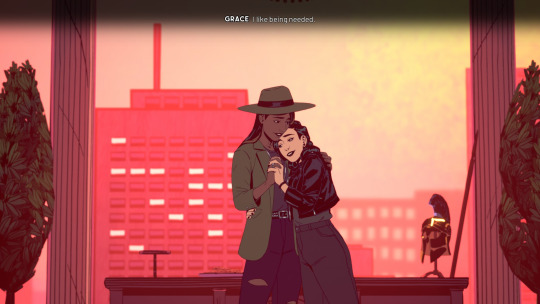
So, yes. I obviously brought Freddie back and the two ended up getting together in one of the more wholesome relationships there is in the game. Because, if you ask me, Pan? He just shows up out of the blue and is all sneaky-sneaky. A girl with her head on her shoulders wouldn't immediately fall for him, even if his intentions were good.
And Apollo? I know my friend @mrsarmageddon likes a 'I-can-fix-him-sad-boy' but he was too set in his ways and a little too unwilling to be of any proper assistance until all his secrets had been unveiled.
As for Persephone, she's a very angry woman and also wouldn't have been a healthy choice considering her romance with CALLIOPE in the past. Still, I couldn't help but want her step on me.
I don't know what that says about me. I'm probably secretly a sub/ omega who just wants someone to take care of me.
But let's not dwell on what this revelation could be and instead talk about how Stray Gods pushed the gaming genre to try and be more inclusive in ways no-one had thought of before. Beyond that, I loved the characters. The narrative, while simplistic, was entertaining enough to pull me through my initial playthrough of six and a bit hours. So, it's not even all that long. Which is perfect when you're gainfully employed and have a ton of time-consuming hobbies.
The one major downside to me was the fact it didn't have a chapter select after the first playthrough. If it did have it, allowing me to skip ahead to say 'Act 3' to redo my conversation with Persephone so I could romance her, or skip to certain songs so I could try out different combinations or variations, it would have heightened the gaming experience for me. Instead, Stray Gods forced me to play through the entire game again just for the occasional tweaks I wanted to do in my playthrough.
And now, during The Game Awards 2023, there's been an announcement for ANOTHER musical game called Harmonium. And it features sign language! So, it's definitely something I want to keep an eye on!
YES! TO MORE VIDEO GAME MUSICALS!
But also, don't let it become too overly saturated. During the Game Awards, I couldn't help but notice more Souls-like battle systems, using Japan as a setting (for Western developers) and more mechs/ robots.
Now, if you'll excuse me, I need to go and admire the Queen of the Underworld a little bit more. For perfectly REASONABLE purposes.
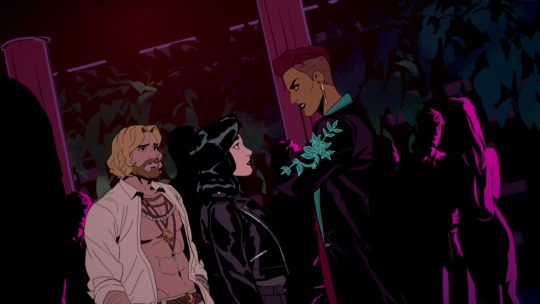
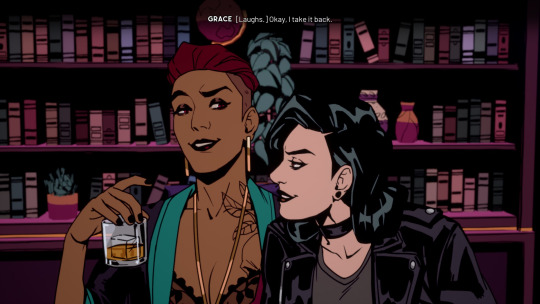

#video games#stray gods#grace x persephone#grace x freddie#musical#why are there so many musicals about the Greek Gods?#charon just wants to play a game
24 notes
·
View notes
Text
WW Normal Album Analysis (pt. 4(?)) 💜
Back at it again, people!
I've been wanting to do this again for a while, since I haven't in actual months. And since @interfacefox 's request won, here I am again because even after almost a year of liking Will's music, my fixation refuses to cease.
If you know what's going on, then you know my whole normal album theory, but if not, here's a link to my last few posts where I analyzed the normal album and puked my thoughts out for people to see:
- Part 1: https://www.tumblr.com/dappydaffer/733190401716027392/this-rant-im-about-to-go-on-will-probably-not?source=share
- Part 2: https://www.tumblr.com/dappydaffer/733737259322474496/ww-normal-album-analysis-pt-2?source=share
- Part 3: https://www.tumblr.com/dappydaffer/734550698381950976/ww-normal-album-analysis-pt-3?source=share
• • • • • • • • • •
I'm not only doing this because of interface, but this is a song I have been itching to do for a while, despite how lengthy/complex it seems, and the song I'm going to be analyzing is...
Black Box Warrior
(I am, however, splitting this up into parts. This shit is waaaay too much for me to analyze in one sitting, so you get the chorus and first (maybe couple) of verses for now-)
• • • • • • • • • •
Although I've heard the song was simply just a challenge for Will lyrically and musically, there is a theory I strongly believe about this song, and that it's an allusion/reference to the illegal human experimentation program, MKUltra, which started in 1953, and continued until 1973. The experiment itself was run and designed by the CIA and its sole purpose was to test means of psychological torture, effects of drugs, and even brainwashing in order to force confessions out of people.
(I mean, hell, even the title is a spinoff name of the experiment itself - "OKULTRA-")
(Read more about it here, it is genuinely interesting as hell: https://en.wikipedia.org/wiki/MKUltra)
• • • • • • • • • •
In bits and pieces throughout the song, starting with the first verse, the lyrics have convinced me the song is either a doctor describing the horrid side effects a now-deceased patient endured due to the means of getting confessions out of them, or an unknown narrator is making it seem like the victim/patient's side effects was this nonsensical, psychedelic adventure, when it reality, it was far much worse.
Lyrics that either allude to the side effects or hint at this possibility at all within the first verse and chorus include:
"Trojan Horse'd his blood brain barrier and raised the LD-50.."
I belive the trojan horse invading the "brain barrier" is a metaphor relating to the obliviousness of this particular victim, or MKUltra patients in general, to the psychologically damaging actions being inflicted on them, and the effects they are yet to bring on them. The trojan horse tale tells of greek invaders successfully tricking the Trojans into letting them in, making it seem as if a giant wooden horse were a gift. The victim could also be seeing, or being told so by doctors inflicting them, that these experiments are for the greater good, when it really is just a heap of psychological torture and abuse in disguise, slowly and surely going to attack and seep in once it gets past the patient's defenses. Instead of immeadiately attacking, I believe that's where the LD-50 part of the metaphor kicks in. LD-50 is a term that refers to the amount of chemicals given, which causes 50% of the deaths in a group of test animals (usually before releasing the chemical to public) - Not only does this imply that patients are simply just treated like disposable test objects before they officially solidify these means of interrogation/testing as part of the criminal justice system, but it also shows that once the patient's defenses are downed/weakened, the LD-50 (lethal dose) can be further pushed to see how far the testing can go until the patient confesses or succumbs to the side-effects of the torture.
"- the Black Box Warrior, He skipped this town and headed straight down history-"
While I'm certain black box could be a reference to something else, I believe it not only refers to how CIA Director, Richard Helm ordered evidence of the project to be destroyed before the public was informed about it in 1975, but also alludes to how it adds confidentiality to the patient being referred to and personifies him as a stastistic or another case to destroy and rid of in the eyes of those in charge. Him "heading straight down history" could also be an allusion to how he simply just forgotten and/or killed off so easily and quickly, joining others who passed, and waiting for new patients to join him who will only get treated the same as he did, due to the abuse and effects inflicted by doctors.
"Roman candles at both ends in his synapses"
Burning both ends of the candle is a common phrase that exaggerates or tells that oneself is overworking or doing too much or burning themselves out, etc. Whilst synapses are spaces between cells that transmit nervous impulse (correct me if I am wrong). The patient in question having roman candles at both ends of their synapses is what I believe to be physical sensory overload or the "LD-50 being raised" far too high to the point of his nervous system going haywire. LSD was a common psychoactive drug used in MKUltra and when one takes LSD, the nervous system can be/is heavily effected (depending on how heavy the dosage) and from what science can conclude; since synapses, a part of the nervous system, facillitate communication between neurons via transmission of signals in neurotransmitter forms, and therefore play vital roles in the brain functioning properly (perception, memory, emotions, etc.), burning metaphorical roman candles at the ends of this patients' synapses implies that a scary, damn near lethal dose of LSD has been injected into the patient by doctors working for MKUltra.
"Shields himself from reason in a Kevlar baby-blue Tuxedo"
I believe here the song is panning to the doctor and a 3rd person point of view of what his intentions/thoughts are. Scrubs that doctors wear are typically a shade of "baby-blue," and kevlar is a material commonly used in bullet proof vests. With the doctor wearing a metaphorical baby-blue bulletproof vest, it could symbolize that the doctor may have a heart to at least barely acknowledge that what he is doing is wrong, however, it is his job to do so for the project, therefore he may be rationalizing and hiding behind his status as a doctor (hence the tuxedo metaphor, as I view tuxedos as a sign of high social/financial status) in order to dodge the bullet of actual reason (hence, the kevlar reference).
"If it was going to kill you boy, it would have by now / There's no more looking back, it's looking up or looking down"
This piece of the chorus really feels like a "ride or die" statement towards the alleged patient. The song (or what I assume is the doctor) almost mockingly, or non-chalantly tells the patient that despite everything he has been put through, it wasn't enough to kill him and even though they have far enough pushed him past his physical and mental limit, he (the doctor) almost encourages this patient to continue on and comply with their experiments. This really shines a light on how little regard the higher ups of this program beared for the victims that were unfortunately involved. As for "looking up or looking down," I believe it is the doctor still telling the patient to continue on, until he dies, and either looks "up" to heaven, or "down" at hell. There truly is no more going back. The patient has to keep pushing and not only burn both ends of his synapses with the aforementioned metaphorical roman candles, he has to burn himself out physically and mentally until his body gives into the effects of the torture and LSD.
• • • • • • • • • •
Thank you for coming to my TED talk....holy shit, that took way too long-
I hope you guys enjoyed reading this as much as I enjoyed writing this, and if you have your own Black Box Warrior/Normal Album/Will Wood theory, I'd love to hear them.
I promise I will add more to this analysis with a part 2, however, I may do other WW songs in between that time =)
• • • • • • • • • •
#my hands are in agony#the brainrot is real#will wood#will wood and the tapeworms#the normal album#black box warrior#will wood analysis#“is this shit enough proof for you?”#dappy rants#music analysis
15 notes
·
View notes
Note
for sleepover saturday, id love to know more about that trouble in tahiti you saw!! :)
i really really liked it! it was fairly simple in scope -- no massive dazzling sets or costumes or lights or what have you -- but that fits the opera itself well as short opera with a small cast, and it fits the company, which is a small regional opera company that nevertheless puts on some great shows. i do not think "simple" is ever inherently a bad thing, as long as the work in question fulfils what it set out to do and makes use of the materials it has at its disposal.
the company in question was annapolis opera in, well, annapolis maryland. i caught their barber of seville last october which i also thoroughly enjoyed, though it was fairly bog standard as barber of sevilles go (not a bad thing! that opera is pretty much always a slam dunk). interestingly, i found, they chose to present trouble in tahiti alongside a revue of sorts, in a two-act format. since trouble in tahiti is itself only about 50 minutes long, it was performed as the second act in a two-act performance; the first act was basically a revue of other music of bernstein's from various sources (art song, musical theater, even a selection from his mass). the first act was not a concrete narrative so much as it was a loosely strung together series of scenes ruminating on love and life as bernstein wrote and thought about it. indeed, many of the musical numbers were introduced or bridged by direct quotations from bernstein or those close to him (like his wife) on that same subject. as a concept it seemed kind of ambitious, but i was surprised at how much i enjoyed the final product; i thought the selected songs were a nice balance of bernstein's musical output and language, a balance of serious/sad/funny/lighthearted/emotional, a balance of the full cast's talents in solo and ensemble performance, and the selected texts (sung and spoken) were thought provoking. my one complaint is that i wish they'd included attribution somewhere for each of the spoken quotes, because i'd like to know who said what and in what context sometimes.
as for the second act, the opera itself, it was just fantastic. i already love the score for this one and seeing it performed live was just thrilling. i feel like this one slips under the radar very frequently and doesn't get a ton of productions these days (whether due to its small size or due to perceptions of it being dated), so it was such a treat to see it performed near me! the cast was really wonderful: the actor who played sam had also played bartolo in barber of seville last fall, and it was great to see a completely different side of his acting skill come out for this. dinah was lovely and her attitude and emotional turmoil were very readable, and she had a great voice. and i loved the trio! y'know since they're not named characters (they're more of a greek chorus kind of deal) it's easy, even when listening to the score, to overlook their parts as being less important or demanding than the two leads, but seeing it live really dispels that notion. they are onstage a lot and their parts are, vocally, really impressively demanding. it's not the kind of coloratura fireworks you expect from a prima donna or anything but rather that tight, closed, midcentury jazz harmony that really relies on the multiple voices in chorus to sound Good, and in practice that kind of singing is REALLY tricky to nail, and i thought the trio did a fantastic job at it. if i had any gripes with this performance at all, it's that i thought it was slightly unbalanced having trio members enter and interact with sam in his office scene but not do the same for dinah in her therapist scene; and i thought the "what a movie!" scene could have been a little more dynamic/interesting with its staging (here it was basically dinah recalling the movie in tempered hysterics while in a hat shop as the trio brings out various hats for her to try on). but, like, those are nitpicks. it was a really good production and i thoroughly enjoyed it. plus bonus points for onstage band
#sasha answers#ask meme#sleepover saturday#...on a monday. sorryyy#leporellian#trouble in tahiti#leonard bernstein#opera tag#trouble in tahiti is great more people should perform it everywhere always amen#oh also i didn't really think anything of it at the time but the band for the show was quite small#and i think it's a reduced orchestration from the original?#in glancing at other production videos online it seems like it's often done with a full orchestra#and this was more like 8 or 10 folks#it was good though
2 notes
·
View notes
Note
Me ? Taking notes again to write this ask? You guessed it.
The ocean saga is 100% my favourite saga so I'm going to be insane about this actually.
12.Aeolus is literally perfect I'm obsessed with her and her little banter with Ody " let's play a game/ a game? / That's what I'm serving " YES MA'AM YOU ARE CERTAINLY SERVING. Again at this point we agree on everything because the part where Odysseus tries to stay awake has kept me awake for days , he is so pathetic he's hallucinating his family and he loves them so much and everything has changed BUT HE'S THE SAME YES HE'S THE SAAAME ( instant tears)
" They were within sight, his mom could have seen the ship" fatal blow , currently chocking on my blood and my tears.
Also yes , Poseidon's voice is majestic, after ruthlessness came out I was singing it so much my brother and sister had memorized it ( they don't even know English lol )
13.The chorus of po-sei-don is glorious and I sing it every single time very drammatically 'cause HOW COULD I NOT??? Again, agree with everything you said, this whole entire song makes me feral, Poseidon is so bitchy and mean and pissed and sarcastic I ADORE IT and whenever I sing it I make Ody's little "No" so defeated and terrified and "we're so fucked " because they so areeeee
You are the worst kind of good- moment lives in my mind rent free I also did some lettering for it because I HAD to get it out of my head somehow ( I failed , it's stuck on repeat in my brain )
" But noOoOo" is so iconic I can't put it into words I love Poseidon jansnsnns
First time I listened to ruthlessness the callback to just a man brought me to my knees Jorge is a criminal how does he get away with causing such pain to me specifically ??? We'll never know
Aaaand the callback to the convo with Polyphemus " I am your darkest moment " FLOORS ME EVERY TIME SIR WHAT DO YOU MEAN YOUR ACTIONS HAVE CONSEQUENCES THAT HAUNT YOU IN THE FORM OF THE GOD OF THE SEA , WHAT DO YOU MEAN MERCY HAS A PRICE ( this whole thing about "you could have avoided all this had you just killed my son" brings me back to hours spent studying the Iliad for school and learning that in those books the idea was that you had to die a glorious death if you wanted to be remembered and live forever with honor in the stories that will be told about you. Being spared in combat and living after that is not living at all, becase you're now a disgrace and everyone will know you failed to be a hero ) ( but I don't know if this whole "moral code" applies to monsters like Polyphemus) ( living with the shame that some random puny Greeks overtook you must generally suck either way though)
also the part where Ody's desperately bargaining "Poseidon we meant to harm we only hurt him to disarm him PLEASE PLEASE UNDERSTAND please we took no pleasure in his pain we are at your mercy right now we can't do anything this is all up to you I can't do anything else for my crew other than try to make you understand we only wanted to escape PLEASE we are in your domain now we can't escape the literal sea PLEASE SHOW US THE MERCY WE SHOWED YOUR SON" and this whole part is quieter and gentler than the rest of the song,it's a plea, a small little desperate string of hope that maybe he'll understand, then a beat of silence and then DIE YOU'RE NAIVE AND HOPELESS DIE AKKSKDJSNNS
I may have gone a little insane with this one lol
As always no pressure but I eagerly await your take on the other sagas :))
( love for you and your friend that you acted out the whole musical , it seems neat and I think it would fix me hahah )
HEYO man theres one artwork of "im the same yes im the same" that im obssessed with, its sooo good
the idea was that you had to die a glorious death if you wanted to be remembered
All the men who died drowning + elpenor ------- :) :) :) yw
Despite it being an unpopular opinion Circe might actually be my least favorite saga so far,....probably because they werent as angsty as any of the other so far......i think theres a pattern here....anyway, its still GREAT so lets start 14. Puppeteer ODY REFUSING TO LISTEN TO EURY, I WONDER??? maybe he guesses???? MAYBE HE KNOWS? that it was Eury who opened the bag but he isn't ready to hear it yet???? the instrumentals in that is soo good tho, ALSO "a woman" "....what"
circes voice do be beautiful
and the storytelling of eury recalling the story while circes part is kind of a flashback like, is reallyyy nice
Also Ody being straight up ready to save his men help, that's only 8 songs or so before Syclla :")
15. Wouldn't you like
I knowwww why people are so hype about it, but admittedly it doesn't hit that hard for me. it's a good song! just not my favorites
but "someone who's not afraid to...send a message" is a sneaky way to make it obv who it is, very "high on shrooms" feels, and Odysseus singing the "OooooOoooOOOooOooH"s towards the end are reallyyy goodddd and the "dont thank me you very well may die"....perfect characterization of hermes, loved 16. Done For
Ody trying to sneak his way in like "did you do smth to them?" (knows 100% that she did) "you turned them into pigs" ODY YOURE SUCH A SLEEK---- SO OKAY WE ACTED THIS OUT RIGHT? WITH MY FRIEND? HAVING MY FRIEND BE CIRCE PLS??? OMG ....attractive mayhaps ody trying to lie about being a god "hermes gave it do you, didnt he?" ".....fine, yes, but- " ODY SIEGSE ~love lying characters, like, Neil, Ody, yeah...yeah Also circe going right into lust and Ody being like "??? wdym" (think sabout penelope) 17. There are other ways "BUuT itS been 12 LonG yeEArs" JORGE JORGE__--SLEGOSEJG lmaoosegseigjseg jk beautiful falcetto (high voice) of Jorge very seductive song, beautiful the reprise of just a man again.....but he refuses! good on you ody, bc otherwise you wouldve been dead, also THE DROP when Circe talks about the Underworld, esp with the distorted choir so cool, theres some animatics that portrayed those really neat too, might ramble about the animatics some other time also Circes last note(s) in the song are SO GOOODDDDD such vocal control
#epic the musical#leyanswers#im stopping here rn bc im scared of the underworld saga help seisejgse i cri#leyrambles#puppeteer#wouldnt you like#done for#there are other ways
4 notes
·
View notes
Text
Okay I’m starting a new series on here called “I just finished this game” where I gush about a game I just finished.
Anyway, if you’re a fan of musicals, visual novels, or Greek mythology, you NEED to play Stray Gods.
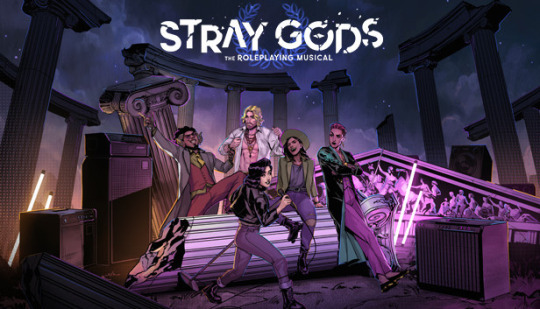
If you haven’t heard of it before, Stray Gods is a visual novel with branching story routes, but it has the twist of also being a musical! Many of the game’s major choices take place in the songs themselves, and the songs will actually changed based on your decisions! Each song has numerous different permutations based on around 3-5 choices in each one. I recommend checking out Challenging a Queen, one of the early game songs that’s relatively light on spoilers, to see how some of the choices really add some spice to the game and weave through the songs.
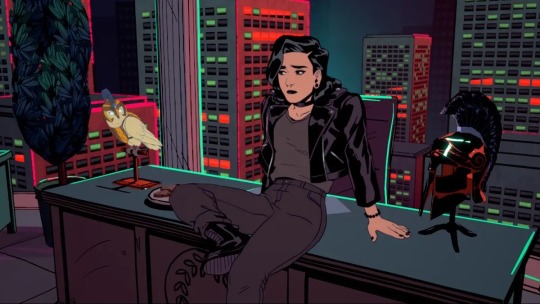
The game’s story just follows Grace, a 20-something girl who witnesses the death of Calliope, the Last Muse, and to make matters worse, she has inherited her powers and role. The Chorus, leaders of the remaining Greek gods (known as Idols), give Grace one week to prove her innocence before she is executed, and the line of Calliope is gone forever.
Accompanying her on this journey are a variety of gods, monsters, and her mortal (strictly platonic… strictly) roommate, Freddie. The cast of Stray Gods is easily its best aspect, full of lovable and complex characters, leaving you laughing a lot, sobbing sometimes, and sometimes not knowing who to trust. And when it’s backed up by a fantastic voice cast, and nearly every character getting their own song if not multiple, I’d be astounded if you managed to get through the game without getting attached to SOMEONE lol.
(For the record, my favorite characters are Freddie, Persephone, and Aphrodite hehe)
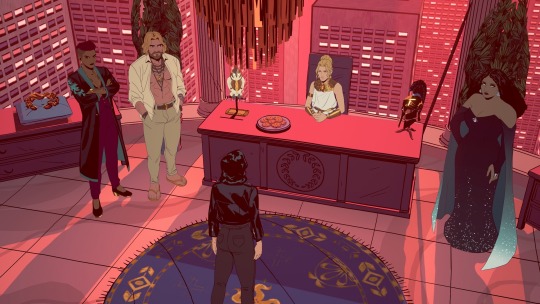
And of course, what’s a musical without its music? The soundtrack of Stray Gods is absolutely incredible, even beyond the incredible amount of work and dedication it took to integrate so many variations of all the songs in the game. Lots of variety with the genre, sometimes even changing in the middle of a song! If I haaad to pick a few favorites, I suppose it’d be The Ritual, Look Into Me, and If Only. I’m a sucker for the emotional songs, but Look Into Me is suuuuuch a banger, it feels so threatening and I LOVE it.

OKAY now I’m gonna gush about my favorite parts of the story and get all spoilery so if you don’t want to be spoiled, DON’T KEEP READING! Go play the game yourself! Iirc it’s on all current platforms. Enjoy :)
So HOLY SHIT APHRODITE’S SONG HIT ME LIKE A BRICK??? I love the moral dilemma her whole cycle of rebirth puts you in, deciding whether to honor her wishes and let her die again or to convince her to find peace in life rather than trying to forget. I tried SO HARD to save her without forcing her and she ended up passing on anyways.
Persephone’s character is also SOOOO well done here, the reinterpretation of her story where she kills Hades is a fantastic direction to take her character. She ended up being my main investigative partner for the game and I did NOT regret it. I almost ended up romancing her, and I definitely will on my next playthrough, but I didn’t this time because of…
Freddie!!! Freddie absolutely rules and is my favorite character in the whole game. Mortal Greek mythology nerd who is super gay and wears a cool hat, how could I NOT love her??? My heart was completely torn to shreds when she died, and even though I knew she had to be able to come back somehow because you could romance her, the fury it raised in me made me blaze through the last four hours of the game and finish it in one sitting XD.
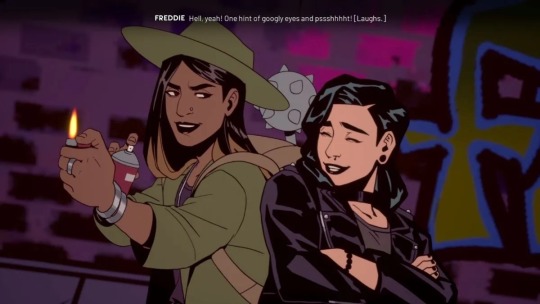
And JEEZ the way they let you bring her back is so well done. It’s not outright good or bad, it’s complex! Freddie and Grace are both traumatized by her death and resurrection, and the fact that you went against Freddie’s wishes and passed the line of Calliope onto her just makes it even more interesting from a storytelling perspective. It’s part of what makes If Only one of my favorite songs in the game. And of course, I’m a sucker for stories of unrequited love like Freddie’s is for Grace and now I’m gonna feel so guilty romancing anyone else 😭. Freddie is so relatable istg.
Anyways uuuuuh that’s all I have to say, maybe I’ll do a full review on my YouTube? Thanks for checking this post out tho! Okay bye :)
12 notes
·
View notes
Text
if eurydice could see me now
song inspired by 'tear you apart' from she wants revenge
and of course, greek mythology
wrote this for napowrimo ☺️
eurydice, muse of mine
i'll take your hand, lead you to my time
let me bring you to this modern world
modern magic, modern love
if eurydice could see me now
look through my eyes, feel how i felt
well i think she'd be pretty proud
or pretty disappointed
just trying to keep it figurative
i write better now than i ever did
send them to tears with the first lyric
nymphs begging, me to risk it
(instrumental chorus)
i see you in parallel
eurydice please, show me hell
will you come up, if i come down
follow me, follow me
she still glitters like the swollen lips
skies of moons, a billion
im checking for a vision trick
to find out how to replicate it
oh muse i can't face you now
i would die, to bring you back
i play my lyre and don't believe the man
im not a fool, im just overwhelmed
blood pooling in the imprint you left
but i leave, there'll be no poets
i arise to the heart's music
i gave up, now i just make it
(instrumental chorus)
eurydice please, show me hell
I think she'll teach me pretty well
"..-dont help me you just help yourself"
she leaves me like a feeling
in modern hell
if eurydice could see me now
look through my eyes, feel how i felt
well i think she'd be pretty proud
or pretty disappointed
(3x with vocals in background and gets louder each time)
#my songs <3#song writing#lyric writing#songwriting#poetry#writeblr#writers on tumblr#original song#napowrimo#escapril
2 notes
·
View notes
Text
In Defense of the Little Shop of Horrors Theatrical Cut

Few words are as dirty as the phrase “focus testing,” the process in which bewildered strangers representing various marketing demographics are ushered into the screening of an unreleased film and then battered with questions about their feelings. Alright, it’s a bit more involved than that, but it’s also a process well known for being used as a crutch by nervous studio executives (also known as The Man) to rein in artistic types who want to try out something that, God forbid, might fail. The fallacy of this system has been discussed in broader scope by more learned souls than I, so today let’s keep it simple. There is one case in which I remain in favor of the results of a focus group: the infamous edited ending of the 1986 film Little Shop of Horrors.
For those not in the know, a brief history: Little Shop of Horrors is, at its basest roots, the story of a poor young man, Seymour Krelborn, who finds a mysterious plant that brings him a great deal of wealth, accomplishment, and the love of the girl he was pining for; trouble being that the plant feeds on blood, and as it gets bigger and the stakes get higher, Seymour has to resort to feeding it bodies. The story was originally a 1960 film born from the production house of gimmickry master Roger Corman, with the plant serving as a pretty heavy handed drug metaphor and Seymour as the only victim. In 1982 the story was adapted into an Off-Broadway musical with a score furnished by future Disney Renaissance composer Alan Menken, becoming a Greek tragedy rather than a morality play (a stroke of genius that no doubt has a great deal to do with the play’s enduring quality). That musical then became the basis for the 1986 film starring Rick Moranis and directed by Frank “he did things besides Muppetry?” Oz.
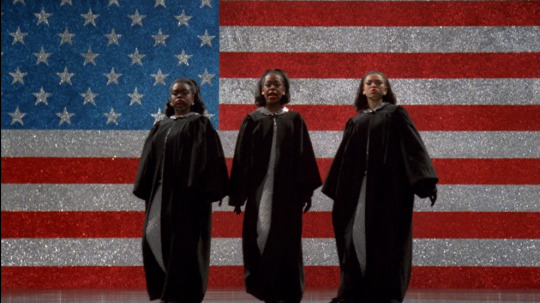
Now, the play ends with Seymour, his paramour Audrey, and eventually the entire planet being consumed by the ravening alien plant dubbed “Audrey II.” Seymour’s undone by his fatal flaw, there’s a Greek chorus, and the show ends on a direct address to the audience called “Don’t Feed the Plants.” It’s a metaphor, y’see. The film was initially shot with that ending as well, until focus groups declared that they hated it, and Oz was forced to go back and shoot a happier ending with Seymour and Audrey surviving (as well as a small Audrey II peeking up out of the idyllic garden). People have hated that ending ever since. But while it’s definitely sappy, perhaps unduly so, it’s still a better fit for the finished film than the original ending.
The first issue is one of medium, which is almost unfair to hold against the film. “Don’t Feed the Plants” is directed toward an audience assumed to be in the same room, and is almost always staged correspondingly (plant props falling on the audience or a giant puppet looming over the seats). It takes advantage of the intimacy of theatre as a medium in order to impress that last message as a plea by the dead characters, and that in-person bond with the actors is a huge part of making something like that work.
Oz tries, to his credit, making the final shot of the director’s cut involving Audrey II seeming to rip through the screen. But it’s simply not the same, and once the characters we’ve spent 90 minutes with are dead there’s no urgency or horror in seeing unnamed civilians overwhelmed by vines. Nor does it help that he cuts up the rhythm of the finale to twice its original length in order to have long, looooooong shots of giant plants rampaging through the city. And because it alters the stage convention of Seymour et al returning as plant buds to sing the final number, it doesn’t so much surge into its ending as it limps the remaining six minutes until the credits finally roll. Even Seymour’s death lacks punch on screen. While his stage counterpart died making a final run at the plant with an axe, screen Seymour is picked up and swallowed up with agonizing, passive slowness.

“Passive” is the word du jour when it comes to film Seymour. Rick Moranis’ performance is wonderfully sweet and endearing, and perhaps it’s because of that there are a dozen little cuts and tweaks centered around absolving his character of culpability. Stage Seymour’s arc is one that takes small but active steps toward his own damnation, thus making it a tragic but fitting end when he sacrifices himself trying to end what he started. Film Seymour might go through the same basic motions, but as film goers we’re used to sympathizing with people who do bad things for sympathetic reasons. And the film almost goes out of its way to make the overall tone sympathetic: the film death of sadistic dentist Orin ends with Seymour saying that “it was for her,” and Orin’s first confused and then non-repentant reply hammers home that this is a man better off dead; likewise, by having Seymour successfully pull the gun, it cuts away the staged version of Orin pitifully begging Seymour (in song!) for help.
Mushnik’s death is also given a semi-karmic edge in the film. While stage Mushnik is no saint, the script plays genuinely on the fact that he’s troubled by the implication of Seymour being a murderer (“just so my conscience can rest easy” is his last line before Audrey II starts up “Suppertime”). Film Mushnik, meanwhile, not only saw Seymour chop up Orin (rather than only suspecting it) but is perfectly fine with letting that fact slide in the name of blackmailing Seymour for the plant. And Seymour’s active hand is once again removed, having him babble in shock until Mushnik trips into the plant on his own (stage Seymour manipulates Mushnik into crawling right into Audrey II’s mouth). In both cases Seymour’s biggest sin is passivity, allowing bad things to happen for his own advancement but not actively taking part in them. Even “Feed Me” is restrained: one would think that the film would take advantage (as it does with other numbers like “Somewhere That’s Green”) on at least a cutaway or two when Seymour is indulging in his more selfish desires for fame. Instead, we stay in the room (which probably has something to do with that fantastic puppet), and Audrey II looms so large as to make Seymour seem like the helpless prop.
Much of this is helped along, in the stage show, by the three chorus girls (Chiffon, Crystal, and Ronette) who comment on the action of the play. Most of their numbers are cut or shortened to help with the film’s pacing, meaning that numbers like “You Never Know,” about Seymour becoming famous after his radio interview (and positively loaded with the toxic masculinity and capitalist success language that push him to his doom throughout the play), gets replaced with the functional but less subtext-heavy “Some Fun Now;” the reprise of the opening cautionary tale prior to the end of act I is gone; and, most importantly, “The Meek Shall Inherit” omits Seymour’s monologue.
“The Meek Shall Inherit” is the montage number wherein Seymour is deluged by contracts, fame, and fortune. The meat of it can still be seen in the film, though you’ll notice that Seymour mostly sits, silent and bewildered, as he has for much of the film. The full song, by contrast, includes an interlude where Seymour argues with himself about signing the contracts, knowing that agreeing to it will mean killing more people to keep Audrey II alive. But, afraid that Audrey won’t love him without his success, he makes the decision to go through with the agreements – it’s his last chance to back out, and instead he signs his metaphorical death warrant. The fact that we see him work through and make that decision is crucial as a turning point. It’s what makes the line “you’re a monster, and so am I” work, and it means that without it Seymour works only as a piteous and not a tragic figure.
In fact, the one active move film Seymour makes in distinction from stage Seymour is to take a stand after the arguably accidental murders, not only not making that damning decision about the contracts but instead vocally refusing to give Audrey II more human meat. He becomes a hero struggling to claw his way out of the pit he blundered into rather than a Shakespearean victim, and the needs of the third act correspondingly become different.
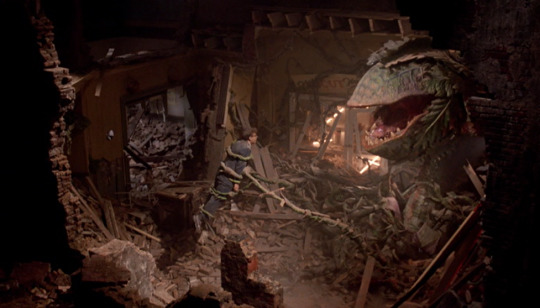
In particular, the film-only number “Bad” (no doubt written, as is common for film musicals, to have a shot at the Oscar’s Best Original Song category) only really works in a scenario where Seymour makes it out alive. It’s a grand eleven o’clock piece of gloating for Audrey II and a brutal, semi-slapstick gauntlet for Seymour as he tries to take the plant down. The effect of placing that sequence before Seymour’s death not only has a cruel effect on the tone (he’s not just eaten but humiliated first, and doesn’t even get that last active choice with the axe), but also results in Audrey II having two victory moments back to back – rather than the confrontation being focused on Seymour’s failing and then leading into the idea of The Plant as a bigger, more metaphorical threat to be presented to the audience.
But “Bad” does work as a final test that Seymour needs to go through to atone for what he’s done, accidentally or not. It works as the moment when he decides to overcome his sin of passivity and become an active hero. That feels, corny or no, like the story the film specifically is writing for its Seymour – not a tragic downfall but a transition from innocence to experience (so yes, even that gotcha moment with the bud works, as it ties well into the idea that Seymour might have to face up to his old sins in future). It wound up telling a different story, one that arguably lacks the brutal emotional punch of the stage show but meshes better with the film’s high concentration of weird comedic bits (looking at you, Bill Murray!). The front half is so loaded with goofy guest stars and tongue in cheek humor, so dialed back in letting Seymour be an actively flawed character, that ironically it’s the tragic end that winds up feeling like a cheat.
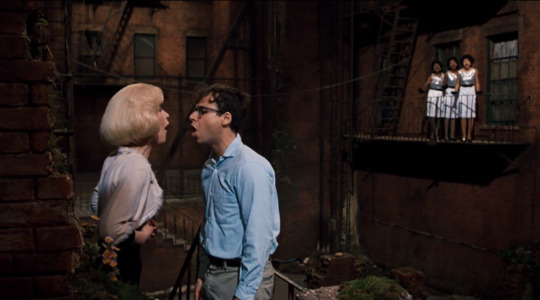
And besides, Rick Moranis and Ellen Greene are too damn cute for me to want anything but the best for them.
5 notes
·
View notes
Text
It's about the YEARNING

Hello and welcome back to Yeaji's immaculate vibes for Friday! Maybe it's because it's October, or maybe it's because I love this song, but it feels like it's time for some yearning. There's plenty of songs that have the feeling, but I think there's one song that stands above the rest.
I'm talking about "Higher" by A.C.E of course. If you haven't heard it, please do yourself a favor and listen to it!
There's a lot musically going on to give it the yearning, but that's more of a Tuesday post, don't you think? The point for today is that it's there. There's an aching feeling deep in this song.
If I remember right, "Higher" is about a mermaid who's planning to risk everything for love. And that is translated perfectly in the music.
This is the song you listen to while riding the bus home in the rain, staring out the window like you're part of a dramatic music video.
This is the song that you would use as a backdrop for a fanmade anime video (iykyk).
It's desperate. It's longing. It's hopeful. It's resigned. It's searching.
It's a love song. It's a breakup song.
It somehow brings every fleeting emotion you might experience in a romantic relationship and puts it into one song.
I have a hard time putting this into words because this song is just... it invokes such strong and dynamic feelings. The song itself is pretty fast, and the music is pushing (reaching? chasing? searching?) and yet it feels like a ballad - maybe because of those long notes in the chorus.
And when I didn't think I could get any more feelings, A.C.E did a live version that sent my heart soaring. It's softer. It has tight harmonies that emphasize the desperation of the music. The band is quieter, without the extra effects in the studio version.
Not to mention, there's something special about listening to live music - I think we can all agree on that. As for "Higher", this live performance, with the adlibs and harmonies, adds so much to the music. There's a rawness in their live vocals (this is also true of the music show stages btw).
Whenever this song comes on, I can't help but belt out the chorus (and I can never hold that note as long as A.C.E but oh well) and the lingering message of "you're in my heart, let's do it, let's do it again"
It almost feels like a tragedy, doesn't it? Like in the musical "Hadestown". Which, side-bar, is excellent. But that tells of the Greek tragedy of Orpheus and Eurydice, and it has this same message. It's a sad song, but we keep singing it. No matter how many times the story is retold, it ends the same.
And yet we keep singing it! We continue to tell the stories of Greek tragedies. We keep reading/watching Shakespeare's tragic plays. We listen to songs like "Higher" or "Glimpse of Us" and we feel the tragedy and the heartbreak.
It may end in tears, but we experience it together. And maybe that's why I like this song so much. Because we all experience this particular yearning together. We carry this longing and loss together.
4 notes
·
View notes
Note
I know you won't be writing dozi and respect that but I read someone bringing up Greek Chorus and your tumblr seems like the designated place for dozi content so I hope you don't mind. See, I'm a dirt poor soul so the only way I get to experience videogames is via gameplay walkthroughs in youtube, which is how I came across the amazing "Stray Gods: The Roleplaying Musical" (10/10 would rec). And as soon as the concept of "eidolon" was introduced (aka the thing that makes someone a God) I just couldn't unsee the parallels with OFA and immediately started wondering just how that would fit into DOZI. As it turns out, I think it would do so quite naturally so long as the passing of an eidolon isn't the inciting incident for the AU's existence. With Izuku established as the class biggest weirdo and secretly entrenched in the OFA-AFO War path, it would open some really interesting avenues of exploration. Sure, some of the Gods plotlines may need to be reworked, since Zeus would need to be still around in some capacity or just very recently gone in order to be a grandpa, but it would still make for a solid scafolding for a plot. At least if we are going with the premise of AFO trying to avoid fighting his family as much as possible.
Let me elaborate; there's a lot going on but for the purposes of this story what you need to know is that Stray Gods is an urban fantasy murder mystery where in order to survive you need to prove to some worn down Greek Gods that you didn't murder their Last Muse in order to get her eidolon. Considering everything in PJO, BNHA, Stray Gods, and what we've seen so far of DOZI, there's so many ways to play this out but here's what I've come up with:
Far as I remember in PJO there's this undercurrent of the Gods depending on their demigods kids for strength and protection and I think that would be a lot more obvious with *these* gods. Maybe the eidolon vessels were always the norm or maybe the situation is new and yet another sign of the gods weakening but either way it's what's happening now. And one of the many lovely things about it is that, while the vessels do get Godly Power OFA-style and even bonus technical immortality, you could argue it is a very empty immortality for the vessel since they may as well be dead. It's not some violent take-over from a new consciousness but more like the powers are not the only thing that seeps through. Soon enough the memories overwhelm the host previous personality until whoever they were is replaced by a true embodiment of the god who chose them. A new vessel could be chosen from anywhere since amongst the demigods (which seems awkward to me) up to amongst completely random people with no previous knowledge of their world, it wouldn't matter since it would be completely up to the god and all demis are duty-bound to respect the choice. *writes while side-eying Knighteye* Another thing is, no matter how much of NOOB the chosen one may be they'd still carry a godly soul within them so they'd outrank even the most badass of demis and are therefore entitled to their protection and respect.
With AFO doing his best to play dead, these world-building changes could open a door for conflict from Inko's side of the family. Like, the eidolon's implications would only compound this Izuku's plentiful reasons to prefer humans to gods. And here he was, doing his best to be his own hero away from his family legacies and suddenly one of his friends gets dragged into the mess in one of the worst ways imaginable. Even if he wasn't a demi he'd still feel duty-bound to step-up as their knight in not-so-shinny red sneakers and it would probably serve as the emotional equivalent of his vigilante arc in this AU. With who his closest friends are in this AU I considered Kouda or Shinso for the role (blame their voice quirks) but surprisingly, I feel Ojiro would make the most sense. The whole reason the game's protagonist got involved in this mess was because a Muse took a liking to them when despite their obvious talent they were feeling stuck and therefore lost, and Ojiro is a criminally underrated badass who'd just like for people to actually acknowledge his skills. Imagine how it would feel like to suddenly be at the seeming center of everyone's radar because you are the main suspect of a murder and your friend's family is even scarier than anyone theorized so he's helping you survive it. But to all of that you can also add the fact that the godly power he was bestowed with was that of A Muse. If you were looking at it from a traditional POV thiss may as well be literal Divine Intervention claiming you are destined only to a supporting role, which may be especially grating coming from the family of that one friend who always stands out naturally. Honestly by the point he realizes how OP Muses can be he'd probably have plenty of cause to regret ever having wanted the attention in the first place.
On the other side, there's no way everyone wouldn't notice their funky little green bean turning into a brooding knight that's intensely invested in Ojiro's well-being. And, for all that he'd hate that someone he cares about must be stuck with an eidolon or die, the muse who died is a pudgy short queen with an affinity for pink so he'd probably want to see justice for her as well. The poor boy was already drowning in secrets without trying to navigate just how much he *can* reveal to save his friend while avoiding disappointing All Might or bringing down Divine Wrath upon them; but "serving" the gods is what he was born and trained for so that's just what he's got to deal with now. Something very fitting with the "Stray Gods" vibe of everyone having unfolding secrets and good intentions which often lead to terrible outcomes. This could be taken to some pretty heavy places, especially if the Furys plotline is kept. So all in all, it'd be really interesting stuff. Heck, I even have a PJO OC that I'm probably never gonna use but that may fit this AU surprisingly well in case anyone wants to adopt this premise.
Well I'm not writing dozi and I'm not writing sg:trm/dozi crossover (had never heard of stay gods before but I'll check it out!) but can I just thank you for sending me all this it was very fun to read. Like fun lore, but also ough the character choices. You said Ojiro and mmmm perfect yes I realized last night I had not been loving Ojiro content as much as I should. He's such a fun pick and this is such a fun (and sad but in a good way) twist of him and Izuku's friendship in dozi. A good helping of being careful what you wish for, friends refusing to let go of each other as life complicates and they change but well. Everything changes. They can change together. They can still be heroes and do good even as it looks different.
Anyway I love the idea and would happily read more about it, thank you for sharing it!
#got a couple minutes left of lunch might spend it looking up this stray gods stuff#pocket talks to people#anon#daughter of zeus inko au#kinda. adjacent. it had an offspring#long ask
2 notes
·
View notes
Text
Eurovision 2006 - Number 31 - Anna Vissi - "Welcome To The Party"
youtube
There had been rumours that Anna Vissi was going to be Greece's Eurovision representative again for quite a long time. Her name was in the frame for 2005, but it took until 2006 for her to finally return. She'd been Greece's representative as far back as 1980 and again in 1982. She's credited as one of the singers to begin bringing Western pop into traditional Greek laiko. She's acted and sung in a wide variety of stage musicals and productions including the first ever Greek rock opera Daimones (Demons). She performed in the 2004 Olympics closing ceremony and off the back of that had a hit single in the US Billboard charts.
Anna Vissi was possibly Greece's number one music star in 2006 and as they were hosting Eurovision, ETV cannot have looked in many other places to find someone to represent them. There was however the choice of song. For that, as in 2005, a song selection national final was organised, again with four songs. It was called Feel the Party and for some reason involved Anna miming to the studio versions of all four tracks. I've added the actual studio version at the bottom of this blog.
One of them was Welcome to the Party by someone who is going to play a huge role in Eurovision in years to come. It's a song by Dimitris Kontopoulos and Zeta Makripoulia. Dimitris is one of songwriters with the most songs ever at Eurovision - he's now part of the 'Dream Team' and most recently wrote Cyprus's 2024 entry Liar
In 2006, he's not yet had a single song on the big stage, but he has written a few national final songs including this one. It's full-involvement EDM, a pounding baseline designed to fill a club and make the floor shake. It absolutely lives up to its title. The instrumental is overwhelming, perhaps too much so as Anna isn't really given much to do apart from hang on and sing her bits at the right points.
It's a sweaty song for sweaty places, and ultimately that wasn't what either the judges or the Greek public were looking for. It came second overall, and Dimitris would have to wait another year and look to other countries for his Eurovision breakthrough. Anna went to Eurovision with a different song.
This song did have a short, second-life above and beyond pretty much ever other losing national final song. It was used at Eurovision in 2006. The very first chorus heard on stage in the semi-final, at the beginning of that starry, mythological run-through of Eurovisions past, is Welcome to the Party. Then the sequence segues neatly into Zeus belting out Nel Blu dipinto di Blu. Anna (quietly) had two song at Eurovision this year!
youtube
#esc 2006#esc#eurovision#eurovision song contest#Athens#Athens 2006#Youtube#national finals#song selection#Anna Vissi#Greece#Dimitris Kontopoulos#Zeta Makripoulia
0 notes
Text
Pt. 3 of my obssessive and deranged song-by-song review of The Tortured Poets Department
See part 1 and part 2
14. "The Smallest Man Who Ever Lived" (Taylor Swift, Aaron Dessner)
This song has gradually, gradually grown on me. On my first listen-through of TTPD, I immediately disliked it. "Smallest Man" is one of those songs that has a steelcore bridge but some pretty flimsy verses and a fragile chorus. I admire the anger and rage—when Swift sings, "You deserve prison, but you won't get time," it reminded me of how I felt about some breakups I went through, and how it felt like the level of emotional damage these guys caused should have been a crime.A lot of fans seem to love "The Smallest Man Who Ever Lived," but to me, it's a 4/10 at best.
15. "The Alchemy" (Taylor Swift, Jack Antonoff)
After the tracklist was released, but before the album actually came out, I anticipated "The Alchemy" being my favourite song, mostly because the title was mysterious and did not immediately indicate any particular tone or mood. I've said before that often, Swift's most mysterious or vaguely titled songs are her best. Do I still feel that way about "The Alchemy?" I wouldn't call it my favourite song on TTPD, but I absolutely love the woozy, slow-paced, intro. "The Alchemy" starts off as a Mazzy Star song, but slides into typical Swiftian territory towards the chorus—the rolling rhymes, idioms and metaphors and romantic subject matter are textbook for her. I wish that Jack had pushed her a little harder to slow down and let the Mazzy Star vibes flor a little longer. The other issue I have with "The Alchemy" is that the metaphors are confused. Most of the song uses football/sports metaphors, obviously referencing Travis Kelce, but then there's a few drug and potion metaphors (such as the "alchemy" of the title, but also chemicals hitting like white whine, heroin/heroine pun). Overall, I really enjoyed the sound and mood of "The Alchemy." I think lyrically, it needs some revision, but musically, Antonoff really hits the spot with his almost drunken reverberating guitar and slow drumbeat.
16. "Clara Bow" (Taylor Swift, Aaron Dessner)
Dessner signals his presence on "Clara Bow" with muffled shoegaze guitar chords that sobers us and brings us back down from the "Alchemy" high. But though Dessner's influence shows through in the melody, the lyrics of this song are pure, 100%—I would be shocked if anyone else had writing input. Here we have Taylor's interest in vintage Hollywood and old Americana (see "The Lucky Ones" or "the last great american dynasty" or even "Timeless"), as well as her prevailing anxiety about aging out of fame and beauty (per "Nothing New.") The lyrics are simple but clear and devastating—I particularly enjoyed "breath of fresh air through smoke rings" and "flesh and blood amongst war machines." The melody is simple but effective, the narrative voice flickering between first-person past (the naive young ingenue), first-person present (real Taylor admits to the grind of fame and beauty) and a kind of first-person plural Greek chorus of gushing studio and label executives. I think that "Clara Bow" is one of the top three songs on Side 1 of TTPD, along with the title track and "Guilty As Sin?."
17. "The Black Dog" (Taylor Swift, Jack Antonoff)
"The Black Dog" has some clever wordplay and beautiful lyrics, but something about the melody and rhythm doesn't work for me. I think it's getting back to my dislike for the quiet verse/loud chorus dynamics that also irritated me on "Who's Afraid of Little Old Me?" Sorry, Nirvana fans. I just don't dig it. That said, I like the fictional conceit of an ex who forgets to turn off his iPhone tracker, or a pub that also serves as a metaphor for depression.
18. "imgonnagetbyouback" (Taylor Swift, Jack Antonoff).
This is also a song that I initially disliked—for quite a while—and it has grown on me to some extend. I don't think I could ever love imgonnagetyouback, and I think Taylor Swift must feel the same way, or she wouldn't have given it this unbearable title. There's something halfhearted about this song, like Taylor wasn't terribly interested in making it, but someone from the label convinced her to. There's a couple of tired Taylor-isms on it, like her comparison of a relationship to a car crash (yawn). But, like all of my least favourite Taylor Swift songs, there's always one part that makes me smile, and here it's, "EVEN IF IT'S HANDCUFFED, I'M LEAVING HERE WITH YOU." Still, what is this reputation outtake doing on The Tortured Poets Department?
19. "The Albatross" (Taylor Swift, Aaron Dessner)
It's like Aaron Dessner woke from a 100-year-slumber and dug his way out of an overgrown Victorian graveyard with his fingernails and then crawled into the remains of the "ivy" house to compose this song. It made me smile to hear Taylor throwing back to evermore era with "The Albatross," though what this song lacks is a unique identity as a member of the Tortured Poets Department era. I still think the orchestrations are beautiful, and I love the refrain of "terrible danger."
20. "Chloe or Sam or Sophia or Marcus" (Taylor Swift, Aaron Dessner)
This song suffers from the opposite problem that "The Black Dog" has. The melody is beautiful, but something about the lyrics isn't working for me. What Taylor does best is the specificity with which she writes relationships—every anecdote and moment feels both intensely personal to her, and yet, universally relatable. I think Taylor veered a little too far to the "universally relatable" side here, writing a song that feel familiar to anyone who's struggled to support a friend or lover with an addiction—but she's not selling the story. It feels artificial. But I do love the gentle, teasing guitar and Dessner's moody piano. It reminds me of Big Red Machine's "Birch."
Stay tuned for parts 4 and 5 of my song-by-song review of The Tortured Poets Department.
0 notes
Text
Fringe Day #4
Tit Swingers
One of many shows inspired by the success of Six, this show uses the music gig conceit to deliver a punk rock show about the infamous Anne Bonnie and Mary Reed. The Hellcats perform all their own music supported by Calico Jack on drums. A heady mix of punk rock sea shanties and aggressive anti-establishment bangers bring two under sung pirates to the fore.
The drums were a little loud, drowning out some of the tunes, but that may have been down to the size of the venue and might've been different if we weren't sitting so close to the drums. The cast were fantastic and playing Calico Jack as a himbo sidelined by the Hellcats was a stroke of genius.
44 Sex Acts In One Week
Easily the weirdest show I've seen so far. An aspiring writer barely making ends meet writing articles for a shitty clickbait site volunteers to write a feature article to earn some quick cash. The feature? Reviewing a best-selling sex guru's book by performing all 44 sex acts in it before a 5pm Friday deadline.
What follows is a mad examination of human relationships and how we affect each other as well as the world around us. Over the top characters and live, radio play sound effects make for a very entertaining watch.
La Clique
One of, if not the, best circus show at the Fringe. Can't fault the show, only the venue which packs 'em in to the detriment of sight lines. The acts were all fantastic with some spectacular aerial performances and amazing gymnastics, not to mention some very memorable clowns. If you're not shelling out a premium for a front row seat though, you might have to settle for simply listening to what is undoubtedly a stunning performance by a very talented tap-dancer.
The show is still worth seeing, no matter what seat you're in. La Clique are absolutely fantastic.
Mary, Queen of Rock!
The comparison to Six is obvious and does this show a disservice. This is a phenomenal musical telling the story of Mary, Queen of Scots, supplanting her Catholicism with rock music and her role as a monarch with that of a rock star. It's a little odd, but works really well.
Like I said, the comparisons to Six are inevitable. There's a core cast of women (all Marys; it was a popular name, apparently), delivering greek chorus narration and a contemporary score. And they very knowingly play up to this similarity in their depiction of Queen Lizzie, but that's as far as it goes. The show stands on its own, and in places even surpasses Six, particularly the finale. Where Six rewrites history for an upbeat fantasy ending, Mary, Queen of Rock! opts for the Hamilton approach and finishes on a celebration of a story that only ends sadly if we stop telling it. It's fantastic.
1 note
·
View note